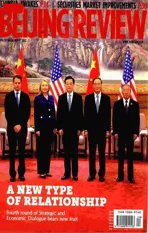MARKET WATCH
2012-12-22
MARKET WATCH
OPINION
Finding Way Out
By Mei Xinyu The Western sovereign debt crisis is sending a chill throughout automobile industries around the world, with expectations of even worse to come. In November, Spain, France and Italy witnessed their auto sales drop 6.4 percent, 7.6 percent and 9.25 percent year on year, respectively. Only the German market increased 2.6 percent. China was no exception, with buyers straying from car dealerships.
Pessimism abounds as global auto markets are confronted with darkening prospects. A new economic recession is simmering, and even emerging economies face dangers.
China may be experiencing a shift in policy focus. Maintaining growth has replaced fighting inflation to become the top priority on the agenda of policymakers. The People’s Bank of China recently lowered the reserve requirement ratio for the fi rst time in three years. Is that a signal that more stimulus for the auto market is already in the pipeline?Chances are slim. Policymakers are less likely to hand out generous policy incentives as they did in 2009 since traf fi c congestion has become an acute problem. Meanwhile, strong stimulus may sow the seeds of a fi scal crisis and asset price bubbles. That is why policymakers pledged to continue with the prudent monetary policy and proactive fiscal policy at the recently concluded Central Economic Work Conference.
As a result, domestic auto manufacturers and dealers are expected to face greater pressures in the coming year and they should be prepared for a prolonged industry downturn.
Nevertheless, the market slowdown also presented opportunities for the auto industry.The time is right to strengthen consolidation of the highly fragmented industry. China’s auto manufacturers mostly boasts large scales. But the auto trade sector is reeling from severe fragmentation, with a number of small traders engaged in fi erce competition. The Hebei Province-based Pang Da Automobile Trade Co. Ltd. (Pang Da) is China’s largest auto trader, but its market share was merely 2.6 percent in 2010. Those cash-swash companies would be able to take advantage of the market downturn and acquire smaller competitors.
But deep-pocketed fi rms must learn lessons from South Korea’s Daewoo Motors and avoid seeking aggressive expansion blindly. The South Korean auto giant went bankrupt in 2000 as it embarked on massive acquisitions, which led to pro fi t slump and credit crunch.
China’s Pang Da is also at the risk of financial strains. On April 28, 2011, the company raised 6.04 billion yuan ($954.2 million) via an initial public offering at the Shanghai Stock Exchange. But two months later, there was only 500 million yuan ($79 million) left as the company spent recklessly on dealership network expansion. On August 25, the 500 million yuan was used to subsidize its cash flows. In November 2011, Pang Da received approval to issue bonds of no more than 3.8 billion yuan.It is likely that the capital will be quickly spent. Meanwhile, the fi rm’s net pro fi t in the fi rst half of 2011 nose-dived 36.19 percent from the previous year to 410 million yuan($64.77 million).
Chinese entrepreneurs must keep alert against possible risks and push forward expansions at a reasonable pace.
THE MARKETS
Online Shopping
Chinese consumers intended to spend 11 percent more to shop online during the holiday season at the end of 2011, according to a survey by Visa International.
They fork out an average of $822 in spending this year, the biggest increase among eight markets polled.
The fi gure is higher than the global average level of $701, said the credit card fi rm in the survey over 502 respondents in China.
A total of 4,033 consumers between 18 and 55 in eight markets in the Asia-Pacific region,including Japan, Singapore and Australia, were covered in the survey.
The Chinese respondents said they plan to increase their online spending since they are able to enjoy merchant discounts and a wider choice.
Pressuring Counterfeits
The Of fi ce of the U.S. Trade Representative in a recent report listed four Chinese markets as “notorious markets” known for pirated goods and services, including the Petty Commodities Market in Yiwu, Zhejiang Province, Beijing’s Silk Street Market, the C2C auction site Taobao.com,as well as the search engine Sogou.com.
The list, however, has raised suspicions that the United States may be using the list to pressure Chinese companies.
“Some products in our market are low-end ones, but it does not mean that they are pirated goods,” said Chen Jinlin, Secretary General of Yiwu Christmas Goods Industry Association.
“Many of our products have been a market hit in Western countries thanks to reliable quality and affordable prices,” he said.
“If we produced counterfeit goods, I am sure the foreign clients would not have placed so many orders,” he added.
Fang Xingdong, independent analyst and founder of Blogchina.com, said the United States should deal with such problem in an economic or legal way, instead of politicizing the problem.
(The author is an associate research fellow with the Chinese Academy of International Trade and Economic Cooperation, Ministry of Commerce)
